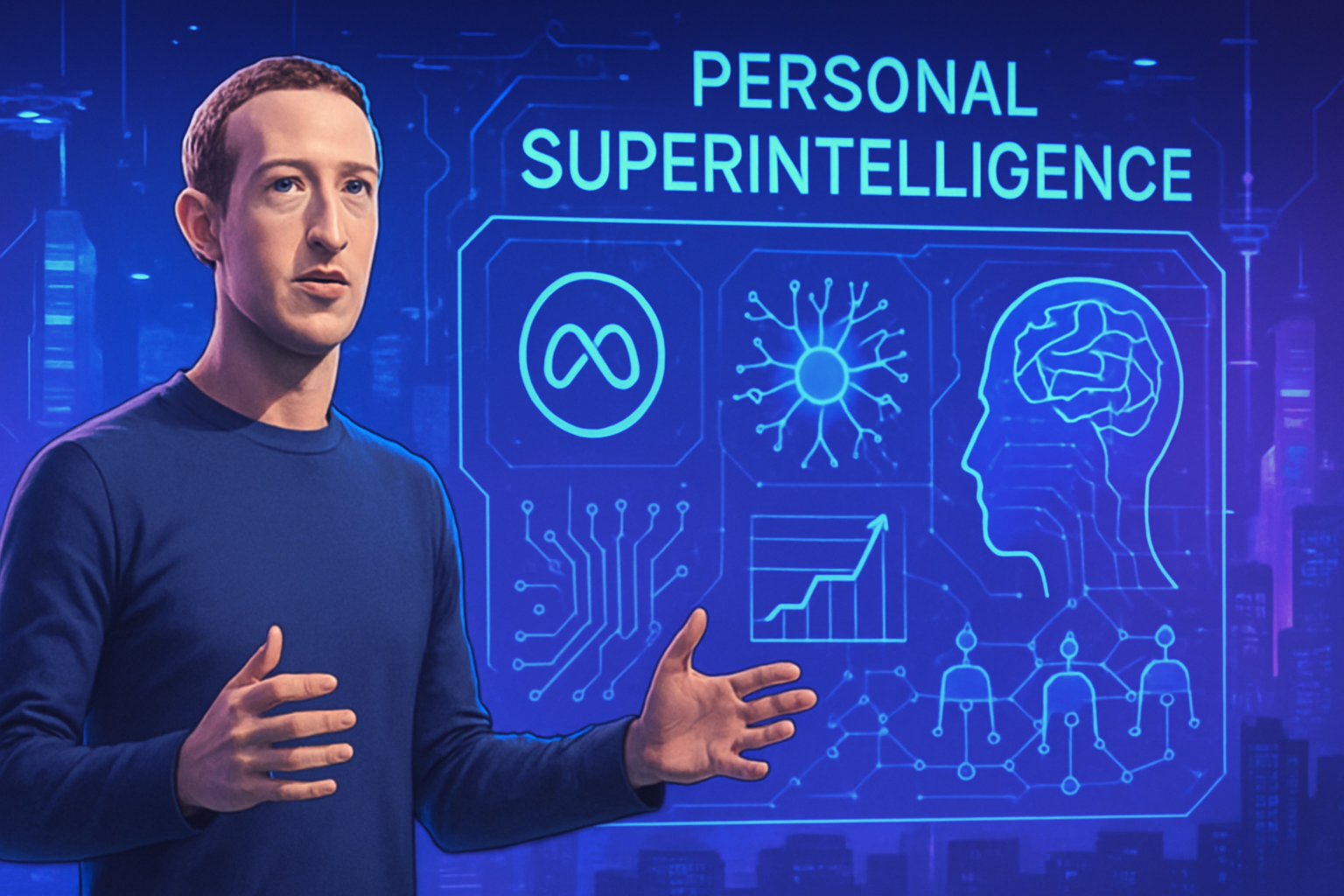Mark Zuckerberg presents a forward-looking vision for a “personal superintelligence”, powered by artificial intelligence. His statements reveal ambitions that transcend work automation. *Meta aims to transform human potential* by fostering individual evolution through technology. This technological revolution promises to marry personal progress with creative achievement, while raising genuine ethical questions.
The technological choices of the coming years will define our relationship with AI, between personal power and dependence. Zuckerberg’s commitment to the individual marks a break from the dominant trends in the industry. *A new era is on the horizon*, where every user could benefit from a truly assistant and liberating artificial intelligence.
Mark Zuckerberg’s vision for personal superintelligence
Mark Zuckerberg, the CEO of Meta, articulated a bold vision for the future of artificial intelligence. In a recent letter, he outlined a horizon where technology transforms into personal superintelligence, accessible to everyone and not solely dedicated to automating routine tasks. This distinctive approach promises to foster individual development rather than mere productivity.
Promising signs of evolution
Zuckerberg shared encouraging observations regarding the evolution of Meta’s AI systems. The progress, though still modest, is beginning to manifest. He stated that, “over the past few months, we have started to see signs of our AI systems improving themselves.” The possibility of developing a superintelligence thus seems increasingly tangible.
An individual-centered approach
Meta stands out from other players in the sector by placing the individual at the center of its project. Zuckerberg has also stated: “The real revolution will be having each person a personal superintelligence helping to achieve goals, to create, to live adventures, and to strengthen bonds with our loved ones.” This conception confronts the ideas of those who envision a centralized AI focused on excessive automation.
Technology and intimacy
Zuckerberg’s vision emphasizes a future where technologies, like smart glasses, blend into our everyday lives. These devices could “see what we see and hear what we hear.” Such immersion would radically transform interaction with the environment and open up unprecedented perspectives regarding AI.
The challenges of security and responsibility
Zuckerberg acknowledges the profound implications that superintelligence could entail. He admits that security concerns will arise, necessitating increased vigilance from Meta. Caution must guide the process of launching new technologies to ensure beneficial power without compromising ethics.
A turning point for technology
A turning point is on the horizon for the future of AI. Zuckerberg warns that the decisions made in the next decade will be decisive. According to him, the choices directing technology towards “personal empowerment” or towards “mass replacement of the human workforce” will shape the future landscape of AI.
Commitment to a personalized future
Meta firmly positions itself in favor of a personal superintelligence. The considerable resources at stake for the company are directed towards this vision. In the future, it will not just be about managing software, but about creating and weaving meaningful connections.
Industry context
Discussions around artificial intelligence are also surfacing in other sectors. For example, Google’s initiative could support OpenAI in reducing its dependence on Nvidia. Meanwhile, concerns related to copyright, addressed in this article about the need for ethical alternatives, continue to raise debates.
Upcoming AI events
For those looking to deepen their knowledge, several events such as the AI & Big Data Expo will take place in Amsterdam, California, and London. These gatherings, coinciding with other major conferences, provide a platform to explore innovations in the tech sector.
Frequently asked questions
What is Mark Zuckerberg’s vision for personal superintelligence?
Mark Zuckerberg envisions a superintelligence that helps individuals achieve their personal goals, create experiences, and enhance their relationships, rather than focusing solely on automating tasks. This approach aims to promote personal growth and individual flourishing.
How does Meta plan to develop this personal superintelligence?
Meta is investing in the development of AI systems that can understand and respond to the specific needs of users, integrating technologies such as smart glasses capable of “seeing” and “hearing” like the user, which would enhance interaction with the world.
What are the differences between Meta’s vision and that of other companies regarding superintelligence?
Unlike other companies that seem to prioritize automation at the expense of the human touch, Zuckerberg asserts that Meta focuses on empowering individuals, believing that progress comes from personal aspirations rather than a hyper-efficient machine replacing jobs.
What risks has Mark Zuckerberg identified related to superintelligence?
Zuckerberg acknowledges that the development of superintelligence raises concerns about security and ethics, particularly privacy and control risks. Meta must therefore be cautious in how it deploys this technology.
What impact could this personal superintelligence have on society?
Zuckerberg believes that personal superintelligence could transform human interactions by enabling people to connect better, create, and share experiences while avoiding a trend towards a system where workers rely on benefits from extensive automation.
Why is it essential to focus on self-empowerment through AI according to Zuckerberg?
Zuckerberg argues that self-empowerment is fundamental for human development and creativity. Rather than allowing technology to dictate our future, it is crucial to give individuals the power to shape their own reality and pursue their dreams.
What is the short-term future for the personal intelligence proposed by Meta?
In the coming years, Zuckerberg predicts that our society will find itself at a crossroads where the decisions made will determine whether we move towards a future of personal empowerment or towards a model where technology largely replaces humans.






